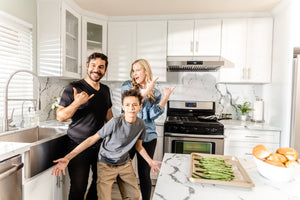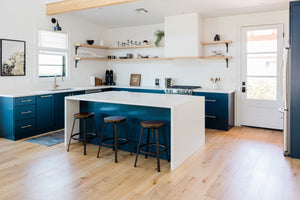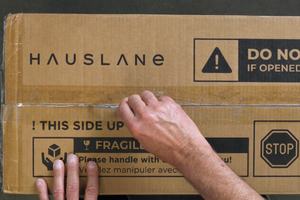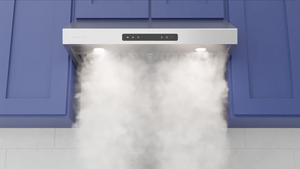Understanding Noise and Sone Ratings for Range Hoods
Homeowners who take the time to learn about range hoods truly care about their household's health, and reducing indoor air pollution isn’t the only healthy factor worth considering.
You also want a ventilation system that doesn’t invade your ears and disrupt your inner peace, and that’s not just a luxury. Constant, repetitive noise can impact your mental health, and there’s plenty of scientific research to back that up.
The good news is that you don’t have to choose between your mental and physical health, because today’s state-of-the-art range hoods are designed to reduce noise and optimize air filtration at the same time.
As you shop for range hoods, you can identify the level of sound each model produces by noting its sone rating, which is different than the amount of decibels it produces. Sone is actually far more meaningful when determining how much noise your range hood will make at different settings.

What is Sone? (Sone vs. Decibels)
Sone is a measurement of perceived loudness. Decibels, on the other hand, measure sound pressure alone. The decibel rating doesn’t consider the fact that the human ear perceives certain frequencies and intensities differently.
While decibels are an objective measurement of sound waves and the vibrations they cause, we’re much more interested in which combination of sounds impacts our lives and disrupts our thoughts. After all, if a device is producing sounds at a frequency you can’t hear, it doesn’t affect your life at all. It’s like that tree falling in the forest when no one is around to hear it.
Amazingly enough, there are ways to objectively measure that subjective experience. That’s where sone comes into play, and it’s important to understand how it works if you want a range hood that will enhance your life.
How Sones Compare to Decibels
Sones are measured on a different scale than decibels, making them much easier to understand and far more useful to the non-scientist.
Sones follow a linear scale, just like height and weight. For example, just as 6 inches is twice as long as 3 inches, 6 sones is twice as loud as 3 sones. Decibels, on the other hand, use a non-linear scale that flattens out at a certain level, so 80 decibels isn’t twice as loud as 40 decibels.
You can convert sones to decibels, but it requires a complex formula and some number crunching. If you want to geek out on the numbers and see the formulas, take a look at our more technical blog post and play around with our sone-to-decibels calculator. You can also review a chart that shows you the relationship between each sone score and its equivalent in decibels.

What Do Different Sone Scores Sound Like?
Now that you understand the scale, here’s what that actually means for your ears and their perception of noise.
Sone Range for Household Noise Levels
1 sone: The sound of a refrigerator humming
2 sones: A quiet office or another professional environment
3 sones: A TV playing at a comfortable volume
4 sones: A typical conversation between two people
5 sones: A louder, more active conversation
6 sones: A quieter restaurant setting
7 sones: Light traffic
8 sones: The average sound of traffic
9 –10 sones: Congested traffic sounds
Most range hoods have a sone score between 6 and 10—although Hauslane range hoods tend to be on the lower end, reaching between only 6–8 sones on their max settings. Many operate at only 1.5 sones at their lowest end, and compared to many models with equivalent suction power, they’re much quieter.
3 Additional Factors that Affect Sone Ratings
There are a few factors to consider when buying and installing a range hood that impact its sone rating. Here are three of the most influential ones.

Factor #1: Range Hood Installation
It’s important to ensure proper installation because a poorly installed range hood will affect both performance and noise levels. Proper venting is also key to keeping noise levels down.

Factor #2: Appliance and Motor Size
Range hoods with larger motors have more powerful suction, so naturally, they will make more noise than a similar model with a less powerful motor. Of course, high-quality range hoods with powerful motors include other design features that muffle those sounds, which you can read about in the next section.
When shopping for a powerful range hood, it’s important to buy one that has multiple settings. The lower settings will produce considerably less sound than the highest setting, and you’ll only need to use that high setting for short bursts, when foods produce a lot of cooking exhaust.
All Hauslane range hoods show the range of different settings in the product specs, so if you scroll down to that section, you can see the sone rating on the lowest and highest settings.
Factor #3: Duct Style and Size
Flexible ducts, instead of rigid ducts, make range hood operations quieter because all those folds absorb more sound. Under-the-cabinet range hoods also make less sound, all things being equal. That’s because the ductwork goes under the cabinet, which insulates the sound.
How Hauslane Range Hoods Achieve Low Sone Ratings
Noise reduction is critical to quality of life, and cooking is far more therapeutic when you’re not bombarded by sounds equivalent to congested traffic.
Fortunately, modern range hoods have incorporated the latest technology to reduce noise in a way that previous generations could not. Engineers achieved this by targeting and redesigning key components that produce noise, such as fan blades, motors, and structural materials.
On top of redesigning those noisy parts, they’ve added noise insulation (such as an internal damper) to range hoods that reduce vibrations, keeping those sone scores lower and your mind and body at peace.
Shop Low Noise Kitchen Ventilation
From HAUSLANE
Maintenance Tips to Reduce Noise
Proper installation and regular range hood maintenance will keep your range hood noise at a minimum. Maintenance includes annual cleaning, lubricating moving parts, and other simple tasks that will vary depending on your range hood type and model.
Take a look at our installation guide as well as our maintenance guide to learn more.
If you’ve taken good care of your range hood but it’s getting louder over time, contact a qualified mechanic to have it inspected. All Hauslane range hoods are built to last, and they come with a comprehensive 2-year warranty plan as well as a limited-lifetime motor warranty plan.








